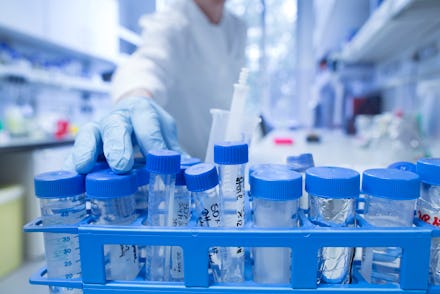With Big Pharma Support, Human Gene Editing Could Be Closer Than We Thought

Here's how you know CRISPR, the revolutionary gene-editing technology getting all kinds of hype around the web, is poised to go mainstream: Big Pharma's getting in the game.
It was recently announced that a $300 million joint venture between Bayer AG (best known for its aspirin) and bio startup CRISPR Therapeutics will aim to develop drugs for blindness, blood disorders and congenital heart disease. It's a logical next step, especially since scientists at a Los Angeles-based medical institute recently proved they could use CRISPR/Cas9 to treat a type of inheritable blindness in mice.
For a little background, CRISPR/Cas9 gives scientists the ability to directly modify or correct changes in our genome, especially ones that come from disease, by "cutting" the genes with a protein called Cas9, which you might call the scissors. When CRISPR is successful, it means that we can change a busted protein — like one from cancer or HIV — and fully correct the problem.
Because of that, CRISPR's pretty much the prom king of genetic engineering right now. It's been identified as a means of potentially curing genetic diseases, improving international agriculture and even being used as a remote control for switching on and off your DNA. But until now, it was more the focus of small agencies, like CRISPR Therapeutics, and both academic and independent labs.
So far, CRISPR hasn't really ventured into human editing, largely due to ethical and scientific concerns. On the science side, delivery of the Cas9 enzyme to its target — for example, cancer — has been difficult. This is also part of why people are hesitant about looser regulation on GMO foods: If the edit doesn't hit the target, it could change the wrong gene. Or result in a butterfly effect and create some bizarre mutant tomato.
What's especially exciting about the venture is that not only are both players focused on helping humans, but a major focus is going to be the delivery system — the weakest link in this whole CRISPR chain. Bayer even has a new department, the LifeScience Center, working toward increasing CRISPR's specificity when it targets DNA sequences. Because accidentally building a mutant is super-bad press for everyone.
But really, spending $300 million to figure out how to make CRISPR more accurate shows that there's a big move toward fixing diseases by directly targeting the disease, instead of trying radiation or drug treatments until something works. With big funding from big pharma, it's not unreasonable to assume that in the next few years, doctors could gain the ability to examine your DNA, identify the problem and be able to edit it out.
We're far from the ability to create Gattaca-esque genetically engineered super-babies, but you have to start somewhere.